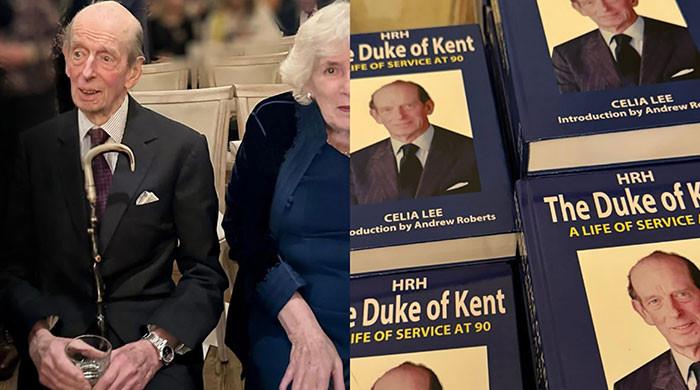Entertainment
Danielle Fishel says her son did not approve of her dancing career

Danielle Fishel’s six-year-old son, Adler, struggled with his mom’s absence while she competed on Dancing with the Stars.
Appearing on the Pod Meets World podcast on Monday, the 44-year-old actress said that although things at home seemed fine, she soon realised her son was having a harder time than he let on.
“So my family has had to make so many adjustments to our daily life since I started season 34 of Dancing with the Stars,” said Fishel, who shares sons Adler, 6, and Keaton, 4, with husband Jensen Karp. “I’m just not able to be there as often as I used to be.”
Before joining the show, Fishel said she was always involved in her kids’ routines like school pickups, sports, and afternoon activities. But her demanding rehearsal schedule made that unlikely.
One day, she got a call from Adler’s teacher after he told classmates that his dad had lost his job and his mom had died.
“The teacher reached out because she was understandably concerned,” Fishel recalled. “I showed up at school, and when he saw me, he ran over and said, ‘Mom, what are you doing here?’”
Fishel told him she’d just come from rehearsal and wanted to see him. When she mentioned she had to go back later, Adler broke down.
“He said, ‘I hate this job. Why did you take it? All you do is dance, dance, dance. You never hang out with me and Keaton anymore. I want you to quit,’” Fishel shared.
Fishel admitted she felt heartbroken but stood firm. “I told him, ‘Mommy loves her job, and I made a commitment. It’s not forever, but I’m not going to quit.’”
Though Adler was still upset and even slammed the car door when they got home, Fishel said they’re working through it as a family.
Fishel, who starred as Topanga on Boy Meets World, was eliminated from Dancing with the Stars last week.
Entertainment
Lisa Rinna breaks silence on longtime feud with Andy Cohen

Lisa Rinna and Andy Cohen have put their very public falling out behind them, with the former Real Housewives of Beverly Hills star confirming the two have reconciled after three years of tension.
The rift between them dated back to Cohen’s memoir, in which the Bravo executive shared private text messages exchanged between himself and Rinna surrounding her exit from RHOBH in 2023, a move that caused a significant fracture in what had been a long friendship.
But in an interview with E! News, Rinna, 62, made clear that things have moved on.
“As humans, we evolve, we grow, we change and we learn from things,” she said.
“Andy and I have done that. I’ve pissed him off. He’s pissed me off. We’ve gone through a lot, and he really is a dear friend.” She added with a laugh, “He’s always been a champion, until he hasn’t.”
The reconciliation happened when Rinna recently returned to Watch What Happens Live for her first appearance since the feud began.
Cohen, 57, used the occasion to apologise to her in person, and by all accounts it was a meaningful moment for both of them.
“It was a beautiful moment,” Rinna told E! News, describing it as “life-changing, healing and cathartic.”
She added, “We really do respect one another and care for one another. I just was so moved by it. It meant the world to me.”
For anyone wondering whether the reunion signals a return to RHOBH, Rinna was characteristically blunt. “No,” she said simply. “I’m grateful for my time at Bravo. I learned a lot.”
Entertainment
Neil Sedaka, singer whose hits included “Laughter in the Rain,” dies at 86

Neil Sedaka, the prominent singer-songwriter whose string of hits in the 1960s and ’70s included “Laughter in the Rain,” “Breaking Up is Hard to Do” and “Calendar Girl,” has died, a representative confirmed to CBS News on Friday. He was 86.
“Our family is devastated by the sudden passing of our beloved husband, father and grandfather, Neil Sedaka,” a statement from the family read. “A true rock and roll legend, an inspiration to millions, but most importantly, at least to those of us who were lucky enough to know him, an incredible human being who will be deeply missed.”
A cause of death was not immediately available.
Scott Dudelson / Getty Images
A key member of the Brill Building songwriting factory, Sedaka teamed with lyricist and boyhood neighbor Howard Greenfield on songs that reflected the teen innocence of the post-Elvis/pre-Beatles era of the late 1950s-early 1960s, including “Happy Birthday Sweet Sixteen,” “Calendar Girl” and “Oh! Carol,” a lament for his high school sweetheart, Carole King.
Sedaka was a Juilliard-trained, Brooklyn-born son of a Jewish taxi driver who began performing as a teen and kept at it for decades. His talent was recognized by a second-grade teacher who urged his homemaker mother, Eleanor, to buy him a piano. At 9 years old, Sedaka had already begun intensive classical piano training at the Juilliard School.
Sedaka loved songwriting and never quit, but he craved performing.
“Once a performer, always a performer. It’s that adrenaline rush. It’s like a natural high when you’re in front of an audience, and if you get that standing ovation, it’s infectious,” he once told The Associated Press.
At 16, Sedaka was chosen by legendary pianist Arthur Rubinstein in a contest as the city’s best high school piano student and performed on a classical radio station as a prize. It was the same year he discovered rock ‘n’ roll, when he performed a song, “Mr. Moon,” he had written with Greenfield, his classmate at Abraham Lincoln High School.
In 1958, at age 19, Sedaka signed with RCA Victor Records and his first single, “The Diary,” enjoyed modest success. He began touring and promoting his songs through regular TV appearances on Dick Clark’s “American Bandstand” and “Shindig!”
At the Brill Building, Sedaka and Greenfield were joined by other up-and-coming writers and lyricists including King, Neil Diamond and Paul Simon.
From 1959 to 1962, Sedaka had 10 records in the Top 10, including “Calendar Girl,” “Oh! Carol,” “Happy Birthday Sweet Sixteen” and “Next Door to an Angel.” But in the mid-1960s, the Brill Building sound, influenced by the doo-wop groups of the New York City streets, was pushed off the charts by the Beatles-led British Invasion and the psychedelic and protest music that followed. Sedaka would endure 13 years “in the wilderness,” as he described it to the AP.
After a long dry spell, he reemerged with such smashes as “Laughter in the Rain” and “Bad Blood.” The Captain & Tennille’s cover of his “Love Will Keep Us Together” was a chart-topper in 1975.
Sedaka told “CBS This Morning” in 2012 that Elton John rediscovered him in the 1970s when he was trying to start his record company. John signed him to his fledgling, U.S.-based Rocket Records label, providing him a chance at more hits with the album “Sedaka’s Back.”
Of the time between jobs, Sedaka said, “The creative mind is still working and it’s a drive. You have you to prove yourself each time. You have to raise the level of Neil Sedaka. You have to top yourself.”
Jason LaVeris/FilmMagic
At Rocket Records, Sedaka and a new writing partner, Philip Cody, topped charts with “Bad Blood” and the joyous “Laughter in the Rain.” He also achieved a rare feat with “Breaking Up Is Hard to Do.” His original up-tempo version went No. 1 in 1962. He re-recorded it as a slow ballad in 1975, and that, too, went No. 1.
Sedaka was nominated for five Grammy awards throughout his career. He was inducted into the Songwriters Hall of Fame, but the Rock & Roll Hall of Fame eluded him despite a fan petition drive.
He still played dozens of concerts a year well into his 80s. Sedaka retained the enthusiasm and broad vocal range of his youth and never tired of the standards he had sung hundreds of times.
“Past 70, Pavarotti told me the vocal cords are not what they used to be. I’m very fortunate that my voice has held,” he told The Associated Press in 2012. “It’s nice to be a legend, but it’s better to be a working legend.”
Sedaka’s songs sold millions worldwide and have been covered by a range of performers, from Elvis Presley and Frank Sinatra to The 5th Dimension and Nickelback.
Sedaka helped propel the career of Connie Francis with “Stupid Cupid” and “Where the Boys Are,” the latter for the soundtrack of the movie with the same name. The Captain & Tennille received a best-album Grammy thanks largely to “Love Will Keep Us Together” and included a nod to Sedaka at the end of the song, when Toni Tennille exclaimed: “Sedaka’s back!”
Sedaka is survived by his wife, Leba Strassberg, whom he married in 1962, and his two children, Dara and Marc.
Entertainment
Duke of Kent marks 90 years of service with biography launch in London

The Duke of Kent stepped out for the unveiling of a deeply personal milestone February 24, a new biography marking his nine decades of life and public duty.
Held at 55 Princes Gate in London, the headquarters of Ognisko Polskie, also known as the Polish Hearth Club, the evening celebrated the launch of HRH The Duke of Kent: A Life of Service at 90, authored by royal historian Celia Lee.
As Patron of the historic London institution, the Duke’s presence carried particular significance.
Founded during the Second World War, Ognisko Polskie has long served as a social and cultural anchor for the Polish community in Britain, making it a fitting venue for an event honouring steadfast commitment and international friendship.
Guests gathered for a literary debut and a tribute to a lifetime of quiet dedication.
The biography charts the Duke’s decades of service, from military duties to representing the Crown at home and abroad, offering insight into a working royal who has consistently favoured diligence over fanfare.
-

 Tech1 week ago
Tech1 week agoA $10K Bounty Awaits Anyone Who Can Hack Ring Cameras to Stop Sharing Data With Amazon
-

 Business1 week ago
Business1 week agoUS Top Court Blocks Trump’s Tariff Orders: Does It Mean Zero Duties For Indian Goods?
-

 Fashion1 week ago
Fashion1 week agoICE cotton ticks higher on crude oil rally
-

 Politics6 days ago
Politics6 days agoPakistan carries out precision strikes on seven militant hideouts in Afghanistan
-

 Tech1 week ago
Tech1 week agoDonald Trump Jr.’s Private DC Club Has Mysterious Ties to an Ex-Cop With a Controversial Past
-

 Business7 days ago
Business7 days agoEye-popping rise in one year: Betting on just gold and silver for long-term wealth creation? Think again! – The Times of India
-

 Entertainment1 week ago
Entertainment1 week agoThe White Lotus” creator Mike White reflects on his time on “Survivor
-

 Fashion1 week ago
Fashion1 week agoIndia’s $28 bn reset: How 5 trade deals will reprice its T&A exports







